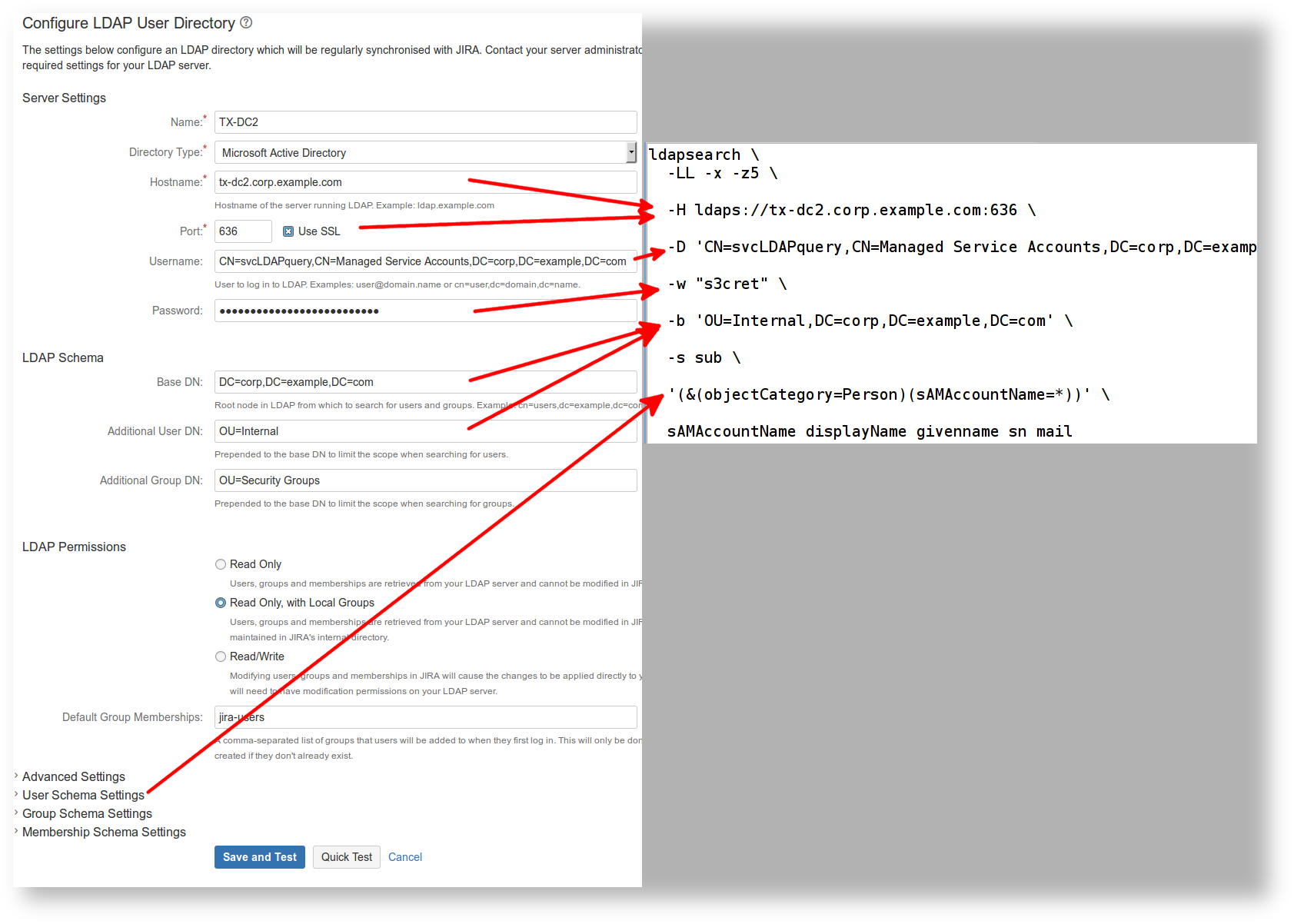
JIRA and Confluence can do authentication against LDAP (e.g. Active Directory), using the standard Java JNDI library. When you're having LDAP connectivity problems, the |
On Ubuntu/Debian:
apt-get install ldap-utils |
On CentOS/RHEL:
yum install openldap-clients |
Furthermore on CentOS/RHEL (6.4 at least), if you want SSL/TLS to work, you'll need to edit /etc/openldap/ldap.conf and add the lines:
## http://serverfault.com/questions/437546/centos-openldap-cert-trust-issues TLS_CACERT /etc/pki/tls/certs/ca-bundle.crt |
See the mentioned URL for why.
If the Use SSL box is checked (typically port 636):
ldapsearch \ -LL -x -z5 \ -H ldaps://tx-dc2.corp.example.com:636 \ -D 'CN=svcLDAPquery,CN=Managed Service Accounts,DC=corp,DC=example,DC=com' \ -w "s3cret" \ -b 'OU=Internal,DC=corp,DC=example,DC=com' \ -s sub \ '(&(objectCategory=Person)(sAMAccountName=*))' \ sAMAccountName displayName givenname sn mail |
This displays results in the form:
dn: CN=Jeff Turner,OU=RedRadish,OU=Contractors,OU=Internal,DC=corp,DC=example,DC=com sn: Turner givenName: Jeff displayName: Jeff Turner sAMAccountName: jeff.redradish_ext mail: jeff@redradishtech.com |
The query does a subtree ( -s sub ) search for all nodes below OU=Internal,DC=corp,DC=example,DC=com, returning the sAMAccountName (i.e. username), full name, first name and email attributes for each. It is limited to 5 results ( -z5 ).
LDAP's startTLS extension also allows a connection on port 389 to be upgraded to TLS ( ldapsearch -ZZ ) but I can find no evidence that JIRA/Confluence support this.
If you can see the existing JIRA/Confluence User Directory, the properties map to ldapsearch parameters as follows:

If you're using PostgreSQL as the database, you can generate the correct ldapsearch command directly from the database. Save this SQL to a file, crowd_to_ldapsearch.sql:
WITH ldap AS (
select * from crosstab('select directory_id, attribute_name, attribute_value from cwd_directory_attribute order by 1,2',
$$values ('ldap.url'),
('ldap.userdn'),
('ldap.password'),
('ldap.basedn'),
('ldap.user.dn'),
('ldap.user.filter'),
('ldap.user.username'),
('ldap.user.displayname'),
('ldap.user.email'),
('ldap.user.firstname'),
('ldap.user.lastname')
$$)
AS ct(directory_id int,
"url" varchar,
"userdn" varchar,
"password" varchar,
"basedn" varchar,
"user.dn" varchar,
"user.filter" varchar,
"user.username" varchar,
"user.displayname" varchar,
"user.email" varchar,
"user.firstname" varchar,
"user.lastname" varchar)
)
SELECT '# For directory ' || directory_id ||'
ldapsearch \
-LL -x -z5 \
-H ' || url || ' \
-D ''' || userdn || ''' \
-w ''' || password || ''' \
-b ''' || "user.dn" || ',' || basedn || ''' \
-s sub \
''' || "user.filter" || ''' '
|| "user.username" || ' ' ||
"user.displayname" || ' ' ||
"user.firstname" || ' ' ||
"user.lastname" || ' ' ||
"user.email"
FROM ldap; |
and run it against your JIRA database:
psql -tAq jira < /tmp/crowd_to_ldapsearch.sql |
The output is one ldapsearch command per LDAP directory configured:
$ psql -tAq < ~/crowd_to_ldapsearch.sql ␀ # For directory 10000 ldapsearch \ -LL -x -z5 \ -H ldaps://tx-dc2.corp.example.com:636 \ -D 'CN=svcLDAPquery,CN=Managed Service Accounts,DC=corp,DC=example,DC=com' \ -w 'REDACTED' \ -b 'OU=Internal,DC=corp,DC=example,DC=com' \ -s sub \ '(&(objectCategory=Person)(sAMAccountName=*))' sAMAccountName displayName givenName sn mail Time: 2.063 ms |